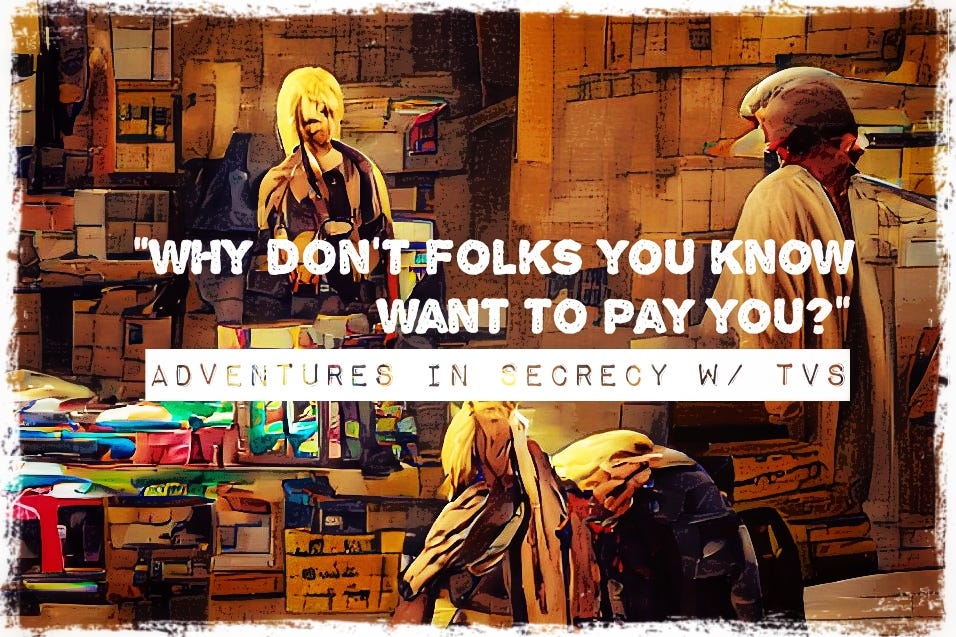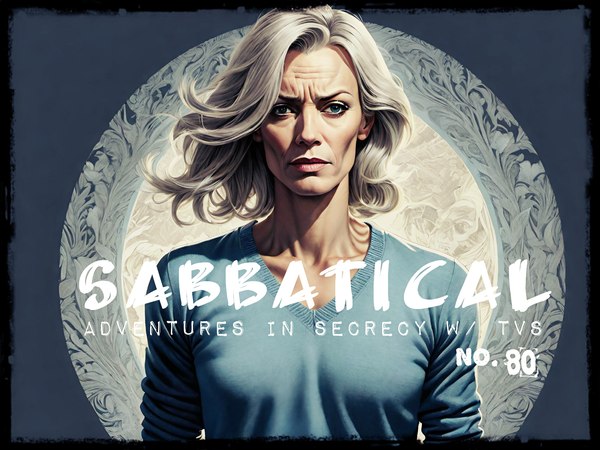Why Don’t Folks You Know Want to Pay You?
Okay, so let me start by acknowledging that some of my bought-in subscribers (and all of the first of them) do, in fact, know me irl. And they bought my book, too. But there are loads more who haven’t purchased my novel or a paid subscription, many of whom I can’t even give free shit to. Presumably they like me as a person—maybe even love me as a person—but they’ve just got no time for my artistic life. What’s up with that? Let’s have a look, shall we.
Mystery
Once someone knows you (or more accurately becomes self-convinced that they know you), their interest wanes. Maybe not in spending time with you or doing fun shit together, but in the whole getting to know each other aspect of the relationship. In my own life I’ve seen how this process can be elongated a bit if one person is kind of reticent or guarded in some way because that preserves some element of mystery. This whole deal played absolute hell on my love life for, well, the entire time I wasn’t married, more or less. Someone would get interested in me because they found me very mysterious, but once they got to know me, they weren’t really all that interested in sticking around. (Or, you know, to be fair, I wasn’t. Whichever.)
Fantasy
The kissing cousin of mystery is fantasy, which here I mean in a very broad sense—not just vaguely medieval ‘high’ fantasy. I mean make-believe, escape, role-play—anything that provides some veneer of glamour that makes our ordinary everyday seem less banal and tiresome, that entices us away and into the cloistered world it supposedly contains. It doesn’t, of course. That’s why it’s fantasy. And we seem to do this a lot, perhaps especially when we’re young, but it’s not like everyone is guaranteed to grow out of it. When we offer fantasy to others, it’s predicated on the unspoken notion that we will not speak of certain things, that we will keep it between us. (Sounds like secrecy a bit, doesn’t it?) And so the folks who really know you can’t easily adopt a fantasy version of you, and when you invite them into your fantasies, it can feel awkward, intrusive, or even repulsive for them to see you in this way because they know (or, again, believe they know) the ‘real’ you.
“I Would Never Want to Belong to a Club That Would Have Someone Like Me For a Member”
Maybe more simply put: self-loathing. If you like them (and especially if you love them), you must be a bit of a jabroni yourself, right? Because what kind of loser would love a loser-y loser lou like them?
Or if we walk it back a bit and afford them a modicum of self-esteem—let’s say they see themselves as basically okay, relatively cool and fun to be with—they still probably don’t think they are fame or acclaim-worthy. And you’re friends, so you’re not either. They probably think you’re a little ‘extra but nice,’ and maybe a tad grandiose or dramatic. (Or maybe even a lot.) It’s like the opposite of a hanger-on who wants to catch any glint of shiny that reflects off you and onto them. So it’s probably not entirely a bad thing that they’re unimpressed by you; but it can be a bit painful when they are completely unmoved by what you do in your artistic life.
Sympathetic but Disinterested
This could be the creed of the modern Middle American. So many folks are so wrapped up in their own shit that they can’t see north. It’s not that they aren’t interested in what you’re doing—they’ll insist that they are. It’s not that they don’t enjoy your work—they’ll say they do, even if it’s ‘a little out there.’ Or maybe even they slap you with backhanded compliments about how smart you are, or what an unconventional mind you have, or whatever. But it all amounts to, “But CSI is on, and I could be watching that.”
They Like You But Not Your Work (and Don’t See Them as Connected)
I’m absolutely certain that I have friends—probably even many close friends—who like me a lot but do not like my work. At all. And in their mind, this is probably a tragic and unrelated thing, sort of like having a good friend with bad breath or something (which may also be true of me, but I hope not). You just … bear it, and don’t say anything. (I mean, I probably would, but you get my point here.) So rather than seeing how important this is to you, how quintessential it is to your sense of happiness, purpose, fulfilment, and expression in the world and engaging with that (which can include criticism that could be helpful), they just pretend like it doesn’t exist. I would say this is the most common default under my ‘friends settings’ on the smartphone of life. But I can’t know for sure, because they pretend like it doesn’t exist.
Anti-Nepotism
In my experience, Merkins hate nepotism and cronyism. Let me quickly clarify: as concepts. We love it just as much as the rest of the world when it works in our favor, but we have this idea in our pussywig psyche that we have to ‘earn’ everything (see also, my screed “On Earning”), work for everything, and don’t get shit for nuthin’. I could delve into the origins of this, but it’s probably very obvious where all that nonsense comes from.
What’s more subtle is how even people who don’t actively believe any of that still passively resist supporting their friends and loved ones for fear of being perceived as participating in nepotism/cronyism or out of a deep seated (but possibly unconscious) hatred of those concepts.
So think about it: is it really unfair to support the people you like and love most? Is that really such a horrible thing?
People Don’t Want to Pay For Anything but Will Pay for Almost Everything
There is so much awesome free shit available in this person’s ‘Murica that you would think no one would ever willingly and knowingly pay for anything. But that’s not what happens. In fact, people will pay for pretty much everything that they could get for free, and many times will prefer the paid option over the free one. Why? Well ‘why’ is always a loaded question, but the most obvious answer is …
Cognitive dissonance—population: you!
So the theory goes if something contradictory happens in your mind, it can’t tolerate it, so it creates wacky ways of balancing the scales and evening things out. One of the most common ideas is about the perception of value and worth. Since we’re conditioned from birth to believe money is valuable, when people, places, things, services, and activities get associated with money, so does that value get associated. (This is another phenomenon called pairing.) So if it’s free, the mind automatically wonders if it really is worthless (or, more accurately, tends to assume it is). Otherwise, they’d be charging for it, right? And if it were really valuable (read: luxury) they’d be charging so much I couldn’t afford it.
There is a case in which valuable things are given away for free: promotionals. So here we have a sales pitch or a lure-you-in-style tactic getting paired with free things. Now not only does charging create a sense of worth, but not charging creates a sense of deception. Yay!
Incidentally, I charge the same monthly fee for this newsletter as Netflix does for its basic monthly subscription. The difference? I give you the option to watch for free. Indefinitely. Now that’s a good value! But will it make you buy in? I’m not holding my breath, for all the reasons I’ve just gone over. And I didn’t write this for that purpose. I wrote it to lay it out for you so that if you’re a creator yourself, maybe it will help you understand your friends better. And if you are the friend of an artist, maybe you’ll rethink the way you are showing up with them.
As uszh, all the best, all mah love!
Xoxo,
T

AIS 0014





